1. Course Introduction
Under the framework of inter-university cooperation between Zhejiang University and University of Munich, the German Major of Zhejiang University and the Deutsch als Fremsprache (DaF) of University of Munich have jointly launched a prestigious classroom project. This initiative aims to enhance professional exchanges between the two countries and build a bridge of friendship between Chinese and German students.
From 2021 to 2023, Zhejiang University selected students from German language each year to participate in online classes offered by University of Munich. Starting this year, the two universities have introduced a blended model integrating online and onsite learning, expanding the program’s reach to universities outside the province.
The 2024 prestigious classroom program at University of Munich, on the theme of “Language, Culture, and Academia”, offers language courses, academic lectures, workshops, and a variety of enriching extracurricular cultural activities.
After a selection process involving self-registration and testing, 22 students from Zhejiang University, Hangzhou City University, Nanjing University of Technology, and Jilin International Studies University participated in this session of the program, including 11 students from the German Major of Zhejiang University.
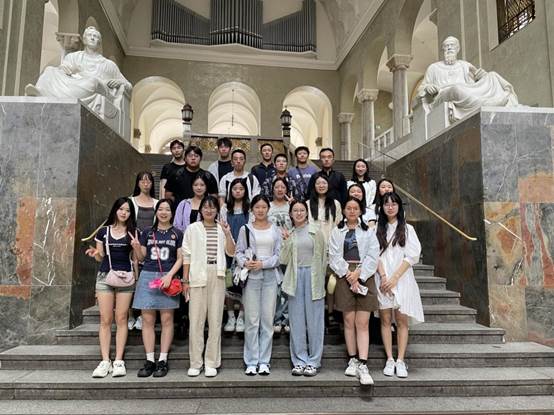
(Group Photo in the Main Building of University of Munich)
2. “Online + Onsite”: Immersive Learning
This session of the prestigious classroom consists of two parts: online courses and onsite practical experiences.
The online courses were conducted from July 22 to August 3. At the opening ceremony, Professor LI Yuan, Director of the Institute of German Studies of Zhejiang University, and Professor Jörg Roche from Deutsch als Fremsprache (DaF) of University of Munich delivered speeches expressing their anticipation for the new model of the program and emphasizing the importance of “embodied learning”. Embodied learning highlights the significance of physical experience in the learning process, transcending traditional classroom-based instruction by encouraging students to actively explore and learn independently in real-world environments. Following this, Ms. Kseniya Borodina, project coordinator from the German side, introduced University of Munich and its DaF program, guiding students through the subsequent two weeks of online preparatory courses and autonomous learning modules.
From August 4 to 17, all participants traveled to Munich, Germany, under the guidance of LIAN Fei, a lecturer from Zhejiang University’s Institute of German Studies, for a two-week exchange program. Centered around the theme of “Language, Culture, and Academia”, University of Munich provided a diverse range of immersive learning experiences for the participants.
The onsite language courses, integrating knowledge, engagement, and critical thinking, were delivered by Maria Christine Hu. In addition to language learning, students engaged in discussions on hot topics such as language acquisition, artificial intelligence, and the internet. Collision of viewpoints during the discussion not only enhanced their language skills but also developed their critical thinking abilities.
“Academia” is another key theme of this session. Two courses, “Language and Language Variants” and “Introduction to Literary Pedagogy” delivered by Professor Jörg Roche and Professor Simone Schiedermair from University of Munich deepened students’ understanding of linguistic diversity, cross-cultural communication, pedagogics, and their practical applications while fostering research awareness and academic interest.
Since 2017, Zhejiang University and University of Munich have launched the “German plus” direct pathway program for undergraduate and master’s studies. Each year, several undergraduate students from Zhejiang University’s German major have taken this pathway to pursue master’s degrees at University of Munich. The academic courses offered in this session of prestigious classroom provided thorough academic preparation for those German students intending to further their studies at University of Munich.
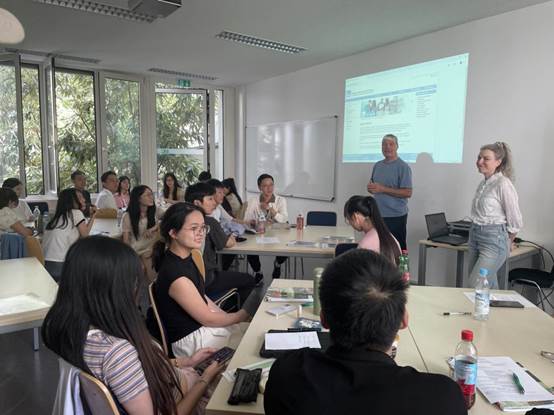
(Onsite Classroom)
3. Learning for Practice: Embodied Learning
“Embodiment” is a significant feature of this summer’s prestigious classroom at University of Munich. As an immersive teaching and learning method, embodied activities are gradually becoming a bridge connecting theory with practice, as well as knowledge with experience. Munich, a city that blends history and modernity, offers an ideal space for embodied learning with its rich cultural heritage and innovative spirit.
Keyword 1: History and Architecture
Residenz München, Schloss Nymphenburg, and Schloss Neuschwanstein, treasures of German architectural history, embrace the essence of significant German history and culture.
Residenz München is both a witness of the glorious period of European court culture, and a carrier of countless historical imprints. Schloss Neuschwanstein, as a paragon of Baroque art, exemplifies the perfect fusion of nature and art. Schloss Neuschwanstein, an integration of various architectural styles and elements, reflects the passion of King Ludwig II for music, drama, and medieval knight legends, so it is an important cultural symbol of Germany.
This session of the prestigious classroom, by bringing history lessons into museums, renders students an immersive experience of historical and cultural contexts. The involvement of multiple sensory pathways—sight, sound, touch—also helps deepen their understanding of architectural aesthetics, historical backgrounds, and cultural atmospheres.
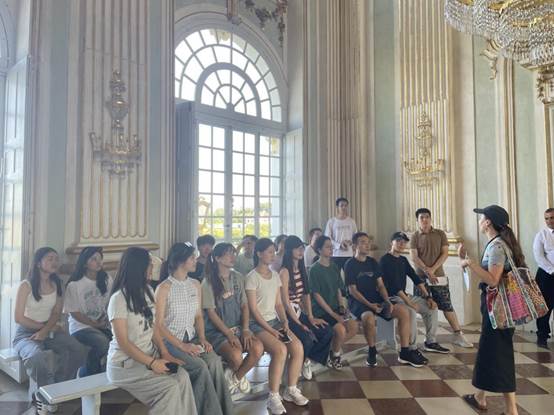
(Historical Art Salon in Schloss Nymphenburg)
Keyword 2: Technology and Art
Deutsches Museum, BMW Museum, and Pinakothek der Moderne showcase the history of Germany in technology and art from different dimensions, as well as the fusion of technology and culture.
The Deutsches Museum, as one of the world’s oldest and largest museums of technology, showcases exhibits across more than 50 fields of technology, including the latest achievements that have won the German Future Award, as well as cultural heritage items like the wooden arch bridge from Zhejiang, China. The BMW Museum highlights the transformation of the BMW Group from an aircraft engine manufacturer to a global automotive giant, presenting BMW’s innovative technologies and design philosophies. The Pinakothek der Moderne houses numerous modern art pieces by German artists. Students not only appreciated works by representatives of Romanticism and Expressionism, but also engaged in painting alongside visitors from around the world, collectively exploring the philosophical theme of “Existence and Cognition” through art.
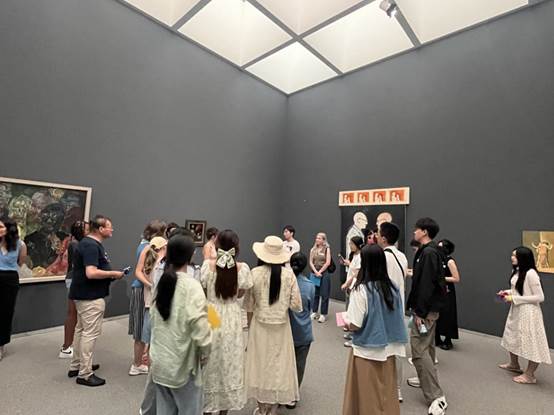
(Visiting the Modern Painting Exhibition Hall)
Keyword 3: Culture and Education
This session’s participants also visited the global headquarters of the Goethe-Institut and Hueber Verlag, both of which are representative institutions of German culture and education.
The Goethe-Institut, dedicated to promoting the German language and culture has extensive in-depth collaborations with the German language community in China. Hueber Verlag has published a large number of high-quality German language textbooks, some of which have been introduced by well-known Chinese publishers. Through this visit, students gained a more comprehensive understanding of the operational procedures of cultural institutions, the processes involved in organizing cultural activities, and the development of foreign language teaching materials. They also engaged in deeper reflections on the inheritance and dissemination of fine Chinese culture.
During this cultural tour, students experienced some of the traditional cultural activities of Bavaria, having a tangible and immersive understanding of the contents previously only in textbooks.
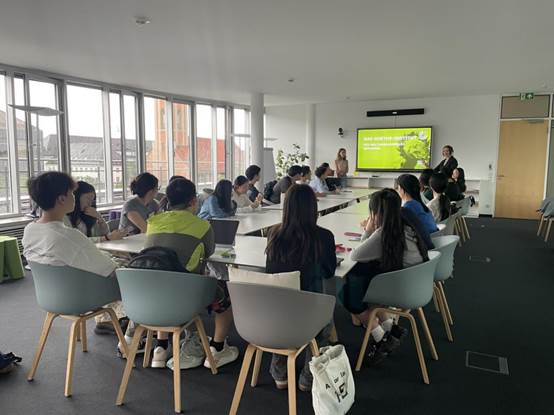
(Visiting Goethe Institute)
Through the above embodied learning experience, students not only gained knowledge and inspiration, practiced cultural exchange, but also deepened their understanding of cultural inheritance, development, and innovation. The summer prestigious classroom program has opened the door to the German speaking world for students, giving them the opportunity to experience Germany firsthand, grow and thrive through interaction with the environment.
4. Student Reflections
WANG:
For language learners, having the opportunity to study in a country of the target language is a valuable experience. I spent a fulfilling and joyful time in Munich.
Of course, learning extends beyond the classroom; society itself is a vast classroom. Observing German society closely and experiencing life through diverse extracurricular visits provided me with a unique experience. For instance, during the visits, I was able to communicate with locals from different social backgrounds, which gave me an initial understanding of their lifestyles and ways of thinking. This has positively contributed to cultivating an open and inclusive mindset.
This trip to Munich has enabled me to face cultural conflicts arising from cultural differences with greater ease, respond appropriately in various social situations, and learn how to balance my studies with daily life.
LI:
Through this prestigious classroom program at University of Munich, I have realized the close integration of language and culture and experienced the charm of embodied learning. The German language has transformed from mere characters in textbooks into a bridge for communication with my German friends, allowing me to gain a deeper understanding of their ways of thinking and cultural backgrounds. Besides, immersing myself in German society has provided me with a more intuitive feel for its cultural nuances.
This exchange not only enhanced my language skills but also sparked my strong interest in the German language and culture, injecting new motivation into my academic studies. As a young student of Zhejiang University in this new era, I will strive to cultivate a sense of patriotism, a global perspective, and professional skills in my future studies, taking on the responsibilities of contemporary youth and contributing to the building of a community with a shared future for humanity.
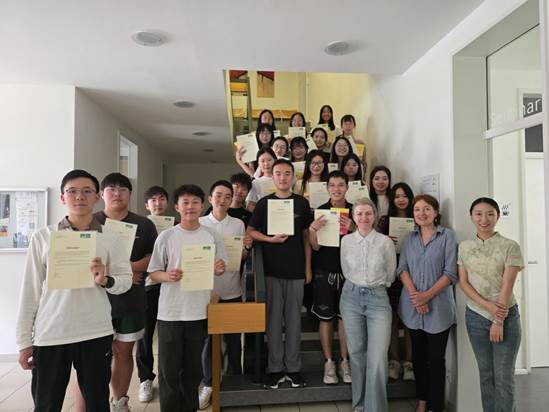
(Awarded with Completion Certificates)
5. Conclusion
The 2024 Summer Prestigious Classroom, co-organized by Zhejiang University and University of Munich, spans four weeks and features a diverse range of activities with rich contents. The two-week online courses and autonomous learning modules laid a solid foundation for the on-site visits. During the onsite learning and visits, German language students from both universities experienced a deep integration of language, culture, and academia. The integration of online and onsite learning modes facilitated a spiral enhancement of knowledge and skills. Through this study visit, students engaged with German society and communicated with people from around the world both inside and outside the classroom. This not only improved their German language proficiency but also honed their intercultural communication skills, deepening their understanding of Germany’s national conditions and culture while enhancing their global competence.
The collaboration between Zhejiang University and University of Munich, two internationally renowned institutions, provides students with a valuable platform for academic and cultural exchange. In the classrooms of world-class universities during their undergraduate studies, students are given opportunies to experience the academic atmosphere, broaden international perspectives and clarify future career plans. We wish all students continuous progress in language learning, cultural understanding, and academic exploration, as they refine their professional skills and become bridges of friendship and cooperation between China and Germany!
Inter-University Cooperation link:
Zhejiang University and University of Munich have established a comprehensive in-depth cooperative relationship in the fields of German language teaching and research, covering undergraduate, master’s, and doctoral education levels. The undergraduate exchange program between the two universities launched in 2008 has benefited about a hundred students. In 2017, the “Direct Pathway” program was introduced to provide outstanding students with convenient access to further studies. In 2021, with support from China Scholarship Council, both universities initiated a joint doctoral training program that has successfully nurtured dozens of exceptional talents in German studies. On an academic level, faculty exchanges between the two institutions are frequent, including collaborative applications for research projects, organizing academic conferences, writing scholarly works, and developing German language teaching materials. The partnership has yielded significant results and has become a model for inter-university collaboration between China and Germany.
Institute of German Studies, School of International Studies, Zhejiang University
Translated by HAN Yaohui, Proofread by XU Xueying



